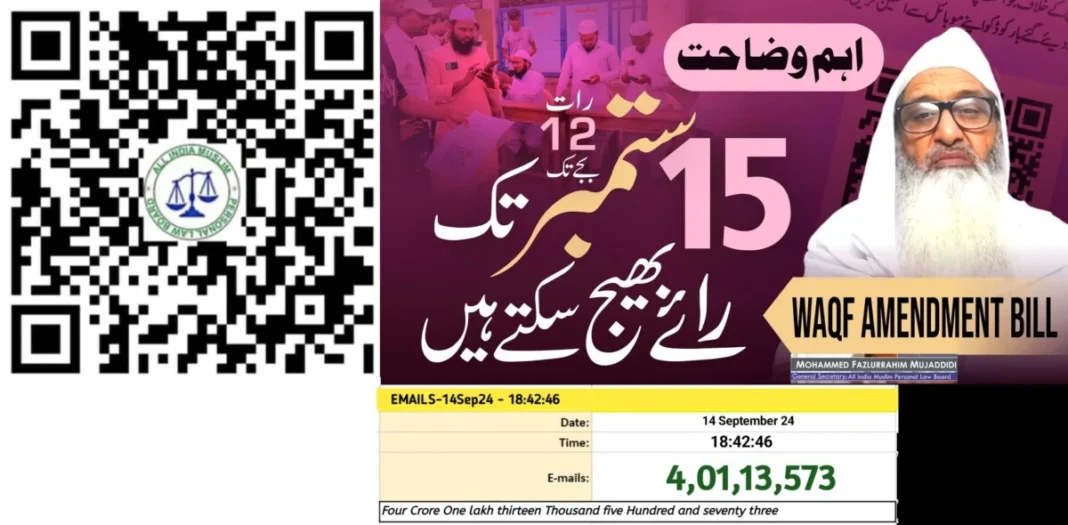Anwarulhaq Baig
NEW DELHI: The battle over the Waqf Amendment Bill 2024 has intensified, with the All India Muslim Personal Law Board (AIMPLB) claiming nearly six crore objections have been sent to the Joint Parliamentary Committee (JPC) in opposition to the bill, while right-wing organizations and the BJP have mobilized their supporters in favour of the bill.
Dr. S. Q. R. Ilyas, AIMPLB spokesperson, reported that by Sept. 13th night, AIMPLB had sent 3.48 crore emails, MURAC 89 lakh, and other groups 95 lakh, totaling over 5 crores. The total has since risen to nearly 6 crore, according to an Indiatomorrow.net report.
AIMPLB President Maulana Khalid Saifullah Rahmani expressed gratitude for the massive response and urged the government to reconsider the bill, citing democratic norms and minority concerns.
The campaign has gained nationwide momentum, with various Muslim organizations joining forces to encourage email submissions to the JPC. The BJP has also ramped up efforts to support the bill.
The JPC is scheduled to meet on September 18, 19, and 20 at the Parliament House Annexe to review inputs from stakeholders, including experts and various organizations.
Earlier, confusion had arisen regarding the deadline for submissions. While some sources indicated a September 13 deadline, others suggested an extension to September 15. AIMPLB General Secretary Maulana Fazlur Rahim Mujaddidi confirmed the extended deadline of September 15.
Mumbai’s Maulana Mahmood Ahmad Khan Daryabadi criticized the extension as a possible strategic move, drawing a parallel with previous instances like the Uniform Civil Code (UCC). Despite this, he expressed confidence in the community’s ability to maintain a strong response.
Major Muslim organizations, including Jamiat-e-Ulama Hind and Jamaat-e-Islami Hind, have been actively promoting the campaign in mosques and outsides. MIM chief Asaduddin Owaisi was also seen actively encouraging his supporters to distribute QR codes and send email submissions after Friday prayers.
AIMPLB reports that Maharashtra leads in opposition, followed by Karnataka and Uttar Pradesh. The board’s secretary, Maulana Umarin Mahfooz Rahmani, remains optimistic about increasing responses and is preparing for further actions, including meetings with MPs and potential legal battles if necessary.
In many mosques, students have been mobilized to encourage worshippers to scan QR codes and submit their objections. The campaign has seen widespread participation from all demographics within the community.
In a broad-based campaign against the Waqf Amendment Bill, women and community groups across India are mobilizing opposition through various means. In Mumbai, activists are canvassing neighborhoods, while Malegaon madrasa students have organized rallies with QR codes to facilitate objections to the JPC. Hyderabad’s Darul Uloom Rashidiya and Jamaat-e-Islami Hind chapters in Akola, Aurangabad, and Nanded have held press conferences and campaigns urging email submissions. In Uttar Pradesh, imams are encouraging objections post-Friday prayers, and Rajasthan’s Muslim organizations have staged marches in cities like Jaipur and Udaipur.
The Mira-Bhayandar Mosques Federation in Mumbai has initiated a postal submission drive, with the Rahman Foundation delivering over 30,000 written objections to Delhi. The Mutahida Majlis-e-Ulema in Jammu and Kashmir has also submitted a detailed letter to the JPC, opposing the bill.
Meanwhile, the BJP has also intensified efforts to support the bill, aiming to inform the Muslim community of its benefits and mobilized its cadres and instructed its MPs and leaders for sending suggestions in favour of the bill to JPC.
However, this move was sharply criticized by Muslim activists, with Samiullah Khan asserting that the numerical disparity between Hindus and Muslims could affect the feedback’s effectiveness. He suggested that earlier protests should have opposed the inclusion of Hindu feedback, emphasizing that the Waqf issue is a solely internal matter of the Muslim community.

